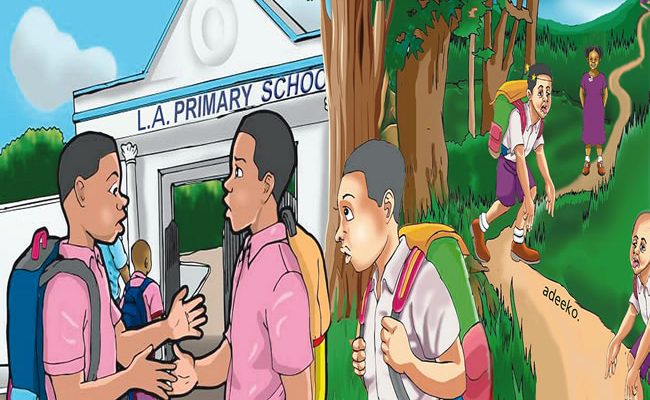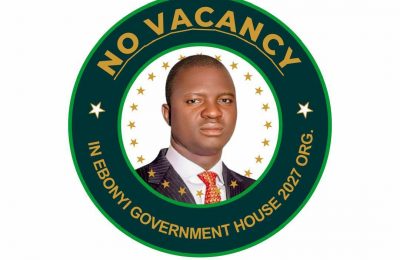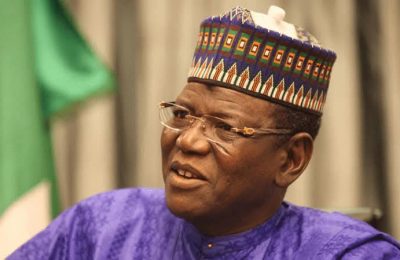
TUNBOSUN OGUNDARE, in this piece, looks at the pains of many school children in Lagos State and the risks they face in their quest for knowledge.
DESPITE global campaign for seamless learning environments for students, acquiring knowledge in Lagos State primary and secondary schools still comes at huge mental and emotional costs, a Saturday Tribune’s survey has shown.

The immediate past Commissioner for Education in the state, Mrs Folasade Adefisayo, had, on several occasions, pointed out that about 26 persons migrate permanently to Lagos State every hour and the majority of them are youths and children who are likely to make educational pursuit, thereby adding to existing challenges of logistics and other issues confronting the state’s educational system, at the primary and post-primary levels.
A major concern for stakeholders is the gap between the continuous rise in the number of children of school ages and the limited schools available for them.
Findings showed that many communities in the state are without a single public school, primary or secondary. For communities with schools, pupils and students appear to have outgrown the capacity of the schools, forcing the parents to look beyond the communities to educate their wards, with the attendant challenges.
From Lagos Island to Mainland, Ifako-Ijaiye, Alimosho, Ikorodu, Epe, Ajeromi- Ifelodun, Ibeju-Lekki, Surulere, Kosofe, Oshodi-Isholo and a host of other local government areas in the state, the story is the same. There are just no sufficient public schools in most of them.
Saturday Tribune investigation revealed that for most local governments in the state, no new primary school has been established in the last five to 10 years.
In Alimosho, considered one of the largest local government areas in the country, with about 65 public primary schools, Okerube Primary School 2, built in 2010, is the most recent in the entire council area.
In Agege Local Government Area, no new primary school has been built in the last 12 years. In Eti-Osa council area, the most recent school is Hon Hakeen Alimi Memorial School at Resettlement, Arararomi, established in 2019.
In Ajeromi-Ifelodun Local Government Area where most residents are low income earners, Afti Computer Centre (not a school per se) at Awodi-Ora and Suru-Alaba could be regarded as the newest primary school in the entire local government area. It was established in 2012.
In Ibeju-Lekki, the newest primary school there is Akinwunmi Ambode NurseryPrimary School at Kayetoro. It was established in 2019. The one built before it, Community Primary School at Lakowe Town, was established five years earlier.
In Ifako-Ijaiye Local Government Area, the newest primary school is Community Primary School at Ogundipe, Jankara. The school appears to be the most recent in the entire state. It was established last year and admitted its first set of students for the ongoing academic session.
In Ikeja Local Government Area, the last time a school was established there was 1998. It is Model NurseryPrimary School at Olusosun.
In Ikorodu Local Government Area, about six schools sprang up between 2014 and 2020 with Idera Community Primary School, Idera, built in 2020, coming in as the newest.
In Lagos Island, St Mary Girls’ Primary School at Ajele, established in 2009, was government’s last outing to date, to provide academic accommodation for the growing number of children in the area. Save for existing schools being upgraded with new structures, the story isn’t different in other local governments.
The vacuum created by public school scarcity is being filled up by operators of private primary and secondary schools. Currently, when secondary schools are added, the ratio of public schools to private schools at the two levels in the state stands at one to 22.
A major implication of this development is that many students who cannot afford private school fees daily travel long distances five days a week to and from public schools in communities closest to theirs which, in many instances, are not less than 10 kilometres.
In Magodo GRA, just a public primary school is available for pupils from within the estate and adjourning Shangisha community. The closest secondary school is at Ikosi, hosting both junior and senior secondary schools. Daily, students from many communities, including the GRA, are seen trekking or riding in tricycles known as Keke Marwa to the school. After the close of school, the majority trek back home, with many of them regularly seen playfully chasing one another recklessly across the road despite the speeding drivers and transporters. The students always appear unbothered about the danger they confront, trekking with little care on the main road.
A school for 200,000-stong community
In Aboru, a community in Alimosho Local Government Area, just a public primary and a public secondary school, Ifesowapo Community Primary and Secondary School, established in 1992, exist for its over 200,000 inhabitants. Except for private schools that absorb children whose parents can afford the bills, no other government-owned school providing free education at that level is available there.
A resident, Mrs Tayo Oyetunde, explained that she is left with no choice but to allow her children to have their secondary education in Iyana-Ipaja, several kilometers from Akinola Street, where she resides, since the only secondary school in the area is stretched beyond its capacity. The hike in the cost of transportation occasioned by the recent fuel price hike is not without its adverse effects on the finances of the 45-year-old petty trader.
“I used to give the two of them N200 as transport fare daily and another N200 for their snacks during break time. It will however interest you that transporters on the route have hiked the fares by 100 percent. I now spend double what I was spending before. The development has put more pressure on my finances,” she stated.
Speaking on his travail as a parent, another resident, Victor, stated that sending a child to an elementary school within the metropolis could be traumatic for the parents and the child. The former banker stated that it took the grace of God for him and his wife to see their children through primary and secondary schools.
Why we resort to begging —Students
While pupils and students with the luxury of being driven to school have their challenges, their counterparts without such comfort face the rigour of trekking kilometres to and from school, exposing themselves to the danger of being knocked down by vehicles on the road or getting kidnapped by strangers whom they beg for free ride home. Apart from begging for free ride, several students have also been seen begging at various bus stops for transport money after school hours.
Students also beg for free ride on BRT buses, hanging around corridors of bus stops to flag the buses down for free ride. Around Adekunle Fajuyi in Ikeja GRA, after closing from school, students from secondary schools in the area can be seen flagging down motorists for lift, sometimes obstructing traffic while at it.
“That has been the spectacle here for some time. While some of them are simply wayward, others genuinely lack. What their parents do is just to provide whatever they can for them to go to school, without giving a thought to how they would get there or come back home,” explained Godwin Afolabi, a commuter, who plies the route frequently.
A JSS 2 student who identified himself simply as Jerome and schooling in Ajegunle in Ajeromi-Ifelodun Local Government Area confirmed this practice to Saturday Tribune.
Jerome said: “I live in Ayetoro and school at Alokoto Junior Secondary School, Tolu Complex, Ajegunle, and I have two of my friends in my neighbourhood who attend other schools at the same Tolu Complex.
“One is attending Reservation Senior and the other, Mokoya Junior High School. Most times, we trek together, especially in the morning. It is just about three kilometres distance and transport fare to and from the school before the recent fuel hike was N600 but it has jumped up to between N800 and N900.
“My parents can’t afford that amount because I still need to eat during break time. So, they only give me N200 each day and I am to decide what to use the money for. And since the amount can’t take me anywhere and I don’t have another means, I use it to eat while I trek with other friends. We don’t enjoy the practice, particularly on sunny days, but we have no options.”
He added that they get to school late and tired most of the time while confirming that they sometimes ask for lift from unknown persons going in the same direction as them and have been lucky on several occasions.
The 14-year-old student said he had no fear of falling into the hands of evildoers such as kidnappers and ritualists in the process of seeking help. According to him, he is an average student academically, but one of his two friends is among the top three performers in his class. He expressed the belief that belief that trekking has no negative impact on a person.
Other students with far-flung schools from home told Saturday Tribune that unlike Jerome, they don’t like long-distance trekking, but have no option.
Students face risks —Dons
Sharing their thoughts on safety concerns, two university dons, Professor Mopelola Olusakin, immediate past director of Academic Planning at the University of Lagos (UNILAG), Akoka, and Dr Temitope Adewuyi, Head of Psychology Department at the Lagos State University (LASU) Ojo, viewed the topic from different perspectives.
Olusakin said trekking a short distance daily is beneficial to the physical and psychological well-being of children as well as adults, noting however that trekking long distances could lead to tiredness and weariness such that school children may not be able to concentrate on their studies and may even fall asleep during classes.
While pointing out that children could be involved in road accident or any other disasters while trekking, particularly close to highways, she said bullying could also be encountered in the process, especially when it is a long journey.
“They can become hungry on the way too and lose concentration on things that are going on around them,” she added.
The counselling psychologist, now the director of the newly-established UNILAG’s Safeguarding Centre, explained that when it involves children, waking up very early and sleeping very late, because of school, is not acceptable. According to her, children need to have about nine hours of sound sleep daily to be healthy and depriving them of adequate sleep could lead to headache, sluggishness and under-achievement. She recommended the choice of schools close to home.
Dr Adewuyi, on her part, differentiated between pleasure and induced trekking, saying the former would boost one’s health while the latter constitutes serious danger. She added that induced trekking that leads to being late to class would have multiple adverse consequences for the affectedvstudents.
These, according to her, may come in the form of poor assimilation, concentration, poor performance in class works and examinations and low self-esteem, with inferiority complex likely to set in.
“But if the situation at home is pleasurable, devoid of emotional or traumatising condition by feeding well, sleeping well, socialising with others, and they have time to relax before the commencement of lesson, trekking won’t be a bad idea,” she added.
Nonetheless, Adewuyi reasoned that it is better and safer for students, particularly at adolescent stage, to school near home where they will not be unduly stressed.
“While government needs to build more schools and spread them across communities, parents, especially the working class, should also consider how near their children’s schools are to their homes. This is important as I have seen many parents who have to hire smaller apartments just because of their children’s schools and their workplace,” she disclosed.
Security expert sounds warning alert
On the safety of pupils and students begging for alms to commute to school or asking for free ride from unknown motorists amid widespread insecurity in the country, Dr Felix Olorunda, Managing DirectorCEO of SSV Protection Services Ltd, a security company, discouraged the practice, saying it is very risky.
According to him, the average Nigerian would want to genuinely help students in school uniform as he, for one, had done on many occasions when taking his wife who is a teacher to school in the morning.
“I do stop on my own to offer lift to some students who I believe would certainly be late to school if such a gesture was not extended to them. You will know they will definitely get to school late based on the time,” he told Saturday Tribune.
He however noted that it becomes baffling for him that those students don’t always feel the danger in such help, particularly now that a lot of evil activities such as kidnapping, ritual killing and ‘Yahoo Yahoo’ are rampart in the country.
“That is why I will advise parents to educate and discourage their children against asking for or accepting lift from strangers in any part of the country, including Lagos. It is better to get to school late than to fall into the hands of evil people,” he submitted,
Long-distance trekking is not punishment for students —NUT chairman
Giving his take on frequent long trekking by students to school, the chairman of the Nigeria Union of Teachers (NUT), Lagos State chapter, Hassan Akintoye, told Saturday Tribune that there is nothing bad in such practice once it is not a deliberate punishment for concerned students.
He explained that apart from keeping the students physically and mentally strong, trekking also prepares them for the future.
According to him, most parents who are today in top positions across fields trekked long distances to school during their time in their communities. He added that some even went to the stream to fetch water, farmed and still did some house chores every morning before trekking to school.
“So, there is nothing wrong for students whose parents have no money to trek to school. The practice will strengthen them. It is only that they must not be getting to school late, just as we were not during our school years,” he noted.
He, however, acknowledged that some students, particularly of government-owned schools, truly get to school late because of long trek and are mostly not punished for it, unlike in the past, when late comers were well disciplined.
He called on the state government to provide transportation palliative for students by designating buses to pick them to and from schools while stakeholders should continue to discourage lateness to school.
Govt ready to build more schools but… —Parents’ Forum
In his own submission, the Chairman, Parents’ Forum, Lagos State, Deacon Olusoji Adams, acknowleged the insuficiency of both public primary and secondary schools across the state but noted that the forum had been agitating for government’s intervention to close the “huge gap.”
He pointed out that the Governor Sanwo-Olu administration has particularly shown its readiness to build more schools across the state but is constrained by lack of land space in communities.
Adams said: “The government has been asking us to go and talk to the community people to give out land space to build schools and we have been doing that through their Baales without much result.
“The problem is that there are no more vacant land spaces in most communities, including the developing areas, that will be enough to build schools.
“The original land owners, popularly called ‘Omo Onile’, have sold off all the available space in their domains.
“They do not plan for anything like building schools in future in their communities. All they are after and concerned about is to make money. That is one problem.
“Another factor that led to the scarcity of public schools in the state is that in 2001 when the current president, Senator Bola Tinubu, was governor of the state, he ceded about 48 schools to the private owners.
“In Mainland Local Government Area alone, 11 schools were ceded and today, no single public senior secondary school exists in the whole of Ebute Meta West.
“These are some of the issues. Nonetheless, the government needs to work out the possibilities as the responsibility of providing education for the citizens rests with it.”
On students seeking free rides from unknown motorists, Deacon Adams, who is a former South West Coordinator of the National Parent-Teacher Association of Nigeria (NPTAN), also condemned the practice because of the risk involved.
He acknowledged that some students truly get late to school because of many factors, particularly inability to afford transport fares which are daily increasing in the state.
According to him, the majority of the students attending public primary and secondary schools are from financially challenged homes and their parents cannot afford to give them enough money for their transportation to and from school and also to eat.
“So, some students will resort to trekking because they don’t have the money and some others will not even go at all.
“But now, as your newspaper has observed students begging for free rides from strangers, we will sensitise ourselves at the local, district and state levels about the dangers inherent in the practice and escate it to our children for those involving in it to stop doing so henceforth.”
READ ALSO FROM NIGERIAN TRIBUNE







